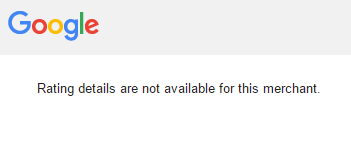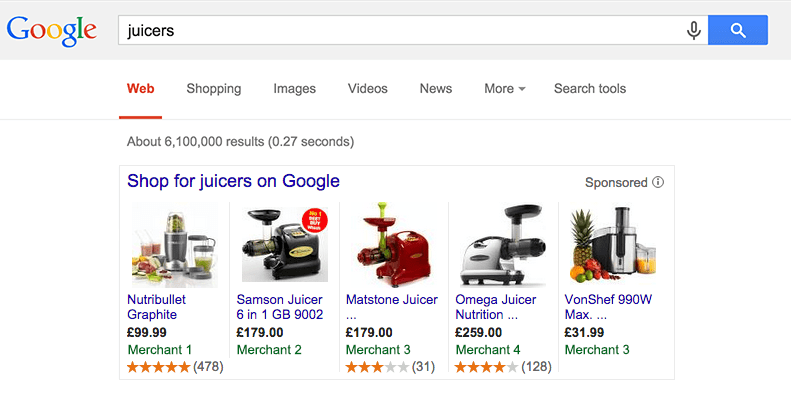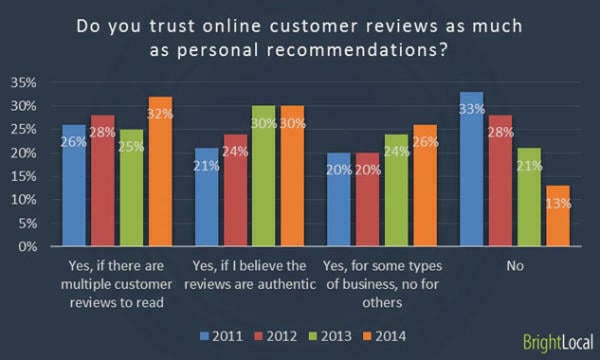
Over the last year customer reviews have become a key asset in most biddable media campaigns. Google AdWords product ratings are a quick way to increase your click-through rate (CTR), lower your cost per click (CPC), and increase consumer trust in your brand.
This post will look at the rise of review marketing and how you can make the most of customer feedback in your PPC campaigns.
Reach For The Stars
Have you ever wondered how to display gold stars in your Google ads?
Google has made it very simple for brands to show ratings – they source reviews from a range of independent third-party review websites which are pre-approved aggregators.
Seller Ratings vs. Product Ratings
Product ratings are different from seller ratings. Seller Ratings inform shoppers that you’re a trusted business with a good reputation, Product Ratings provide vital information to users about a specific product.
Seller Ratings Example
Seller ratings show a combination of information and review stars next to your AdWords ads. These can be found in normal AdWords ads and Google Shopping Ads and look like this:
Criteria for Google Seller Ratings
To harness the power of Google seller ratings and start seeing stars, you need:
- At least 30 live reviews
- An average star rating between 3.5 and 5
- Reviews must not be older than 12 months
- Third-party account name must match that of the name of the company – it is recommended to use your domain name (www.example.com or example.com)
- At least 10 of your reviews must be in the user’s Google interface language
Google sometimes shows ratings for merchants with fewer than 30 reviews, when they have sufficient data from other sources to determine an accurate rating.
How Many Reviews Do You Have Indexed?
Not sure how many reviews Google has indexed for your brand? As you need at least 30 indexed reviews, you’ll probably want to know how many reviews you have indexed so far. Don’t worry, it’s very simple.
Take the following URL (http://www.google.com/shopping/seller?q=YOURWEBSITE.COM) and replace the text at the end with your own domain name. For example, for Thomascook.com use “http://www.google.com/shopping/seller?q=thomascook.com”.
Your results should look like the below:
If there are no reviews indexed you’ll see the following message: “Ratings details are not available for this merchant”
http://www.google.com/shopping/seller?q=notreallyadomain.com
AdWords Product Ratings Example
Product ratings show stars from reviews specifically related to the product being searched in Google Shopping. Product ratings can appear for products with any number of stars, from 1 through to 5. A product must have at least 3 reviews in order for product ratings to be eligible to show on Google.com. A merchant must also have 50 reviews across all products in order to participate in the program.
They look like this:
How Google Ratings Impact Quality Score
So how do seller and product ratings improve the all-important Quality Score?
According to AdWords “Quality Score is an estimate of how relevant your ads, keywords and landing page are to a person seeing your ad.” The three primary Quality Score factors are:
- CTR
- Landing Page Quality
- Relevancy
Ad Level Quality Score
Seller and product rating stars increase your CTR which in turn has a positive impact on your Quality Score thus lowering your average CPC.
Landing Page Quality Score
Landing page Quality Score doesn’t affect your ad position but it is taken into account for your eligibility to go to auction.
Your bounce rate and time on site are taken into account in your landing page Quality Score. So use positive reviews to make improvements to the URLs to which you drive traffic.
Displaying relevant user-generated content (UGC) on your landing page promotes the transparency and trustworthiness of your site.
Why Use Reviews?
So why do companies go to such huge lengths to use ratings and reviews in their PPC campaigns?
Google Recommends It
Google says that “ads with Seller Ratings get a 17% higher CTR than the same ads without ratings.” This in turn will lead to increased traffic and increased opportunity for conversions.
They Can Increase Conversions
PPC Hero reports that “for one e-commerce client, we saw conversion rates increase by 25% and conversions increase by 50% once seller ratings became eligible.”
Users Trust Reviews
90% of customers say that buying decisions are influenced by online reviews (Marketing Land,) and 88% of customers trust online reviews as much as personal recommendation (Search Engine Land.)
Choosing a Review Company
To successfully attract more customers, it’s essential you choose the right third-party customer review solution for your business.
A top review provider will ensure that reviews are easily collected and that all the correct information is shared with Google.
Here are some questions to consider when choosing a review aggregator:
- Is the review platform a Google licenced content partner?
- Are all of the reviews verified?
- Can you reach out to past customers and ask them for reviews?
- Are you able to respond to negative reviews?
- Is there an option to share reviews on social (Twitter & Facebook)?
It’s important to ask these questions to ensure you choose a review provider that will not only help you achieve gold stars, but also provide trusted business insights form your genuine customers.
A Word on Fake Reviews
Fake reviews are illegal in most countries and will do more harm than good for your brand’s reputation. In June 2015, the Competition and Markets Authority (CMA) produced a detailed report into the use of fake reviews, which shone a light onto this growing issue.
Now a hot topic in search, there is increasing concern around fake reviews. Not only can they damage your brand’s reputation, but also diminish the quality of any business insight gained. Whilst some review providers go to great lengths at taking retrospective action, there is a simple way to avoid fake reviews from the outset.
Closed-feedback platforms, like Feefo, only allow users to leave genuine reviews after they have made a transaction on your website. There are multiple benefits to using a closed-feedback platform; ultimately for those interested in Google stars it boils down to having 100% trusted verified reviews sent to Google from a licenced partner.
Google Ratings: The Stats
Here at Feefo we have seen multiple case studies where seller or product ratings have had a dramatic impact on PPC performance.
Using the Google AdWords extensions tool and 5 months of data from Gopak.co.uk, Digital Marketing agency Thought Shift performed a study to examine the impact of seller ratings on CTR.
This study revealed a huge 28.72% increase in CTR when ads contained a star rating compared with when they didn’t.
If you are proud of the reviews you have generated, why not use the data to increase conversions? The implementation of reviews on Gopak landing pages increased conversion rate by 6.77% year on year. Within three months of hosting live reviews the bounce rate decreased by 8.09%.
Logos, reviews and star ratings were placed in prominent places on product pages when customers were at a critical point in the buying cycle.
In a separate study by Digital Marketing agency Red-Eye, Feefo merchant Monarch Airlines saw an average increase of 3% in conversions when their review score was placed next to a buy now button.
How to Ensure You Get 5-Star Reviews
If you already have seller or product ratings on your PPC ads, there are a number of ways to increase the quantity and quality of your reviews.
Execute an Effective Communication Plan
In order for users to review your product or service, they must be aware that they have the option to do so! Email customers shortly after a purchase thanking them and asking them to write a review.
Talk To Existing Customers
Send out an email to your existing database asking for a review. Current customers are already familiar with your products and are more likely to leave a positive review.
Test Review Placements
It’s worth testing where to ask for reviews in the customer buyer cycle, e.g. the purchase confirmation or thank you page.
Respond to Poor Reviews
95% of unhappy customers would return if an issue was dealt with quickly and efficiently (according to the National Association of Retail Marketing). Some review platforms allow users to re-rate a product or service once it has been dealt with by the provider.
Video Reviews
Landing pages with video have eight times more conversions than without a video. Choose a review platform that gives your users the option to submit video reviews.
Local Reviews
If you run a local business (e.g. restaurant, hair salon, veterinary clinic, plumber, personal trainer), you will need local reviews to verify your business.
If you are a local business make sure you choose a feedback system that caters for offline orders. Some review platforms use unique codes presented at the point of sale so your customers can later feedback on their experience.
In Closing
So there you have it. Google links reviews directly to products within the Google Shopping network and companies that use official third-party product review aggregators will reap the benefits.
If you make reviews part of your paid media strategy you will gain the trust of your users and see a considerable increase in conversions.
About the Author
Oliver Ewbank is a Google Certified Partner and Head of Global Digital at Feefo. Oliver’s digital marketing campaigns have won industry awards and his work has been featured in a variety of publications, including BBC News, SEMrush and Virgin Entrepreneur.
















